An American Dream Expanded/Publishers Weekly March 22, 1965
From "Author's League Panel: Book Reviews and Reviewers". Publisher's Weekly. New York, NY. March 15, 1965. p. 44-45.Excerpt from a panel discussion at the Authors League of America held on March 9, 1965, where Mailer airs his views on reviewers and in turn, reviewers cross-examine Mailer. |
An American Dream Expanded.
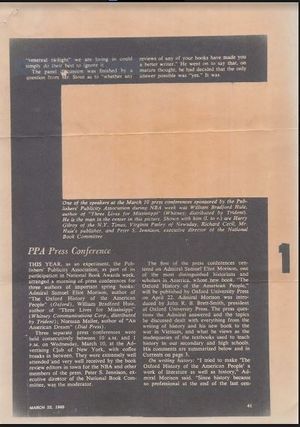
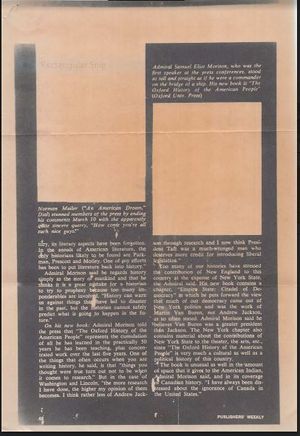
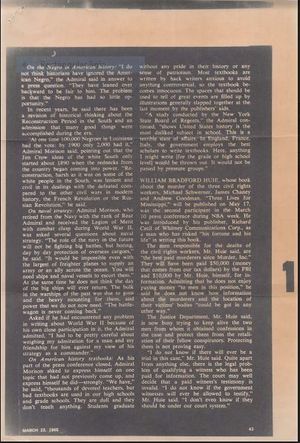
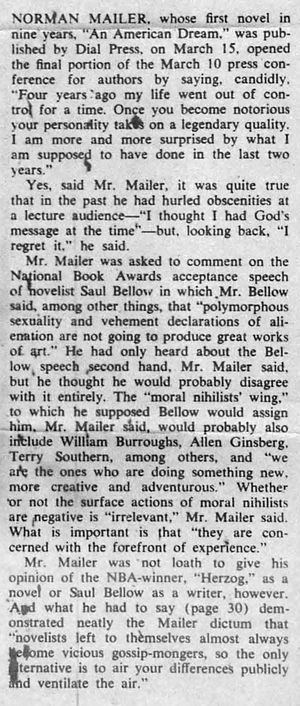
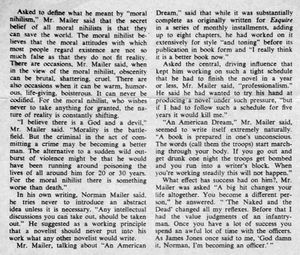
Mailer, whose first novel in nine years, An American Dream was published by Dial Press, on March 15, opened the final portion of the March 10 press conference for authors by saying, candidly, “Four years’ ago my life went out of control for a time. Once you become notorious your personality takes on a legendary quality. I am more and more surprised by what I am supposed to have done in the last two years.” Yes, said Mr. Mailer, it was quite true that in the past he had hurled obscenities at a lecture audience__”I thought I had God’s message at the time”__but, looking back, “I regret it.” He said.
Mr. Mailer was asked to comment on the National Book Awards acceptance speech of novelist Saul Bellow in which Mr. Bellow said, among other things, that “polymorphous sexuality and vehement declarations of alienation are not going to produce great works of art.” He had only heard about the Bellow speech second hand. Mr. Mailer said, but he thought he would probably disagree with it entirely. The “moral nihilists,’ wing” to which he supposed Bellow would assign him, Mr. Mailer said, would probably also include William Burroughs, Allen Ginsberg, Terry Southern, among others, and “we are the ones who are doing something new, more creative and adventurous.” Whether or not the surface actions of moral nihilists are negative is “irrelevant,” Mr. Mailer said. What is important is that “they are concerned with the forefront of experience.”
Mr. Mailer was not loath to give his opinion of the NBA-winner, “Herzog,” as a novel or Saul Bellow as a writer, however. And what he had to say (page 30) demonstrated neatly the Mailer Dictum that “novelists left to themselves almost always welcome vicious gossip-mongers, so the only alternative is to air your differences publicly and ventilate the air.”
Asked to define what he meant by “moral nihilism,” Mr. Mailer said that the secret belief of all moral nihilists is that they can save the world. The moral nihilist believes that the moral attitudes with which most people regard existence are not so much false as that they do not fit reality. There are occasions, Mr. Mailer said, when in the view of the moral nihilist, obscenity can be brutal, shattering, cruel. There are also occasions when it can be warm, humorous, life-giving, boisterous. It can never be codified. For the moral nihilist, who wishes never to take anything for granted, the nature of reality is constantly shifting.
“I believe there is a God and a devil.” Mr. Mailer said. “Morality is the battlefield. But the criminal in the act of committing a crime may be becoming a better man. The alternative to a sudden wild outburst of violence might be that he would have been running around poisoning the lives of all around him for 20 or 30 years. For the moral nihilist there is something worse than death.
In his own writing, Norman Mailer said, eh tries never to introduce an abstract idea unless it is necessary. “Any intellectual discussion you can take out, should be taken out.” He suggested as a working principle that a novelist should never put into his work what any other novelist would write.
Mr. Mailer, talking about An American Dream, said that while it was substantially complete as originally written for Esquire in a series of monthly installments, adding up to eight chapters, he had worked on it extensive for style “and toning” before its publication in book form and “I really think it is a better book now.”
Asked the central, driving influence that kept him working on such a tight schedule that he had to finish the novel in a year or less, Mr. Mailer said, “professionalism.” He said he had wanted to try his hand at producing a novel under such pressure, “but if I had to follow such a schedule for five years it would kill me.”
An American Dream, Mr. Mailer said, seemed to write itself extremely naturally. “A book is prepared in one’s unconscious. The words (call them troops) start marching through your body. If you go out and get drunk one night the troops get bombed and you run into a writer’s block. When your’re working steadily this will not happen.”
What effect has success had on him? Mr. Mailer was asked “A big hit changes your life altogether. You become a different person.” He answered. “The Naked and the Dead changed all my reflexes. Before that I had the value judgments of an infantry-man. Once you have a lot of success you spend an awful lot of time with the officers. As James Jones once said to me, “God damn it, Norman, I’m becoming an officer.”
